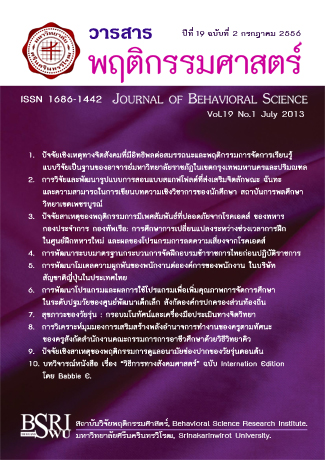ปัจจัยเชิงเหตุทางจิตสังคมที่มีอิทธิพลต่อสมรรถนะและพฤติกรรมการจัดการเรียนรู้แบบวิจัยเป็นฐานของอาจารย์มหาวิทยาลัยราชภัฏในเขตกรุงเทพมหานครและปริมณฑล
Abstract
The Psycho-Social Causal Factors Affecting the Competency and Research-Based Instruction Behaviors of Faculty Members of Rajabhat Universities in Bangkok Metropolitan and Vicinity Area
Received: February 21, 2012 Accepted: May 20, 2012
Abstract
The purpose of this study were to examine and compare the structural relationship models of the psycho-social causal factors related to the competency and research-based instruction behaviors between government lecturers and university lecturers working in Rajabhat Universities in Bangkok metropolitan and vicinity. A total of 720 particeparts were selected. Descriptive statistics were analyzed by statistical package and the hypothesized models were examined by LISREL.
The findings are as follows: 1) The hypothesized structural equation model of the psycho-social factors related to the competency and research-based instruction behavior was adjusted, resulting
in the satisfactory level of goodness of fit indices with c2=440.19, df=93 (p=.00), SRMR=.048, RMSEA=.072, GFI=.93, NFI=.97, CFI=.97, TLI=.97, AGFI=.90, PNFI=.75, and c2/df=4.73.
2) There was a difference in the structural model of the causal factors related to the competency
and research-based instruction behaviors between government lecturers and university employed lecturers. The direct effect of competency on research-based instruction behaviors was found to be different, showing that the effect of government lecturers group was higher. 3) Latent means of competency, conscientiousness, job satisfaction, and perceived organizational support among government lecturers were higher than university employed lecturers.
Keyword: Research-based instruction behaviors, Competency, Conscientiousness, Job satisfaction,Rajabhat University
บทคัดย่อ
การวิจัยนี้มีความมุ่งหมายเพื่อทดสอบและเปรียบเทียบแบบจำลองโครงสร้างความสัมพันธ์เชิงสาเหตุของสมรรถนะและพฤติกรรมการจัดการเรียนรู้แบบวิจัยเป็นฐานของอาจารย์มหาวิทยาลัยราชภัฏในเขตกรุงเทพมหานคร และปริมณฑล ระหว่างอาจารย์ข้าราชการและอาจารย์พนักงานมหาวิทยาลัย ทั้งนี้กลุ่มตัวอย่างจำนวน 720 คน และ การวิเคราะห์ข้อมูลพื้นฐานใช้สถิติพรรณนาและการแจกแจงของตัวแปรด้วยโปรแกรมสำเร็จรูป และการวิเคราะห์ข้อมูลเพื่อทดสอบสมมติฐานด้วยโปรแกรม LISREL ผลการวิจัยพบว่า 1) แบบจำลองโครงสร้างความสัมพันธ์เชิงสาเหตุของสมรรถนะของอาจารย์และพฤติกรรมการจัดการเรียนรู้แบบวิจัยเป็นฐานที่ปรับ มีความกลมกลืนกับข้อมูลเชิงประจักษ์ โดยพิจารณาจาก c2=440.19, df=93 (p=.00), SRMR=.048, RMSEA=.072, GFI=.93, NFI=.97, CFI=.97, TLI=.97, AGFI=.90, PNFI=.75, c2 / 2=4.73 2) แบบจำลองโครงสร้างความสัมพันธ์เชิงสาเหตุของสมรรถนะและพฤติกรรมการจัดการเรียนรู้แบบวิจัยเป็นฐานของอาจารย์มหาวิทยาลัยราชภัฏในเขตกรุงเทพมหานครและปริมณฑล ระหว่างอาจารย์ข้าราชการและอาจารย์พนักงานมหาวิทยาลัยมีความแตกต่างกันเฉพาะค่าอิทธิพลของสมรรถนะของอาจารย์ที่มีต่อพฤติกรรมการจัดการเรียนรู้แบบวิจัยเป็นฐาน โดยอาจารย์พนักงานมหาวิทยาลัยมีค่าอิทธิพลสูงกว่า และ 3) อาจารย์ข้าราชการมีค่าเฉลี่ยตัวแปรแฝงสมรรถนะของอาจารย์ ความมีสติรู้คิด ความพึงพอใจในงาน และการรับรู้ การสนับสนุนจากมหาวิทยาลัยมากกว่ากลุ่มอาจารย์พนักงานมหาวิทยาลัย
คำสำคัญ: พฤติกรรมการจัดการเรียนรู้แบบวิจัยเป็นฐาน สมรรถนะ ความมีสติรู้คิด ความพึงพอใจในงาน มหาวิทยาลัยราชภัฏ
Downloads
Downloads
Published
How to Cite
Issue
Section
License
Behavioral Science Research Institute, SWU
114 Sukhumvit 23, Bangkok 10110, Thailand.
Tel.02-649-5000 # 17600



